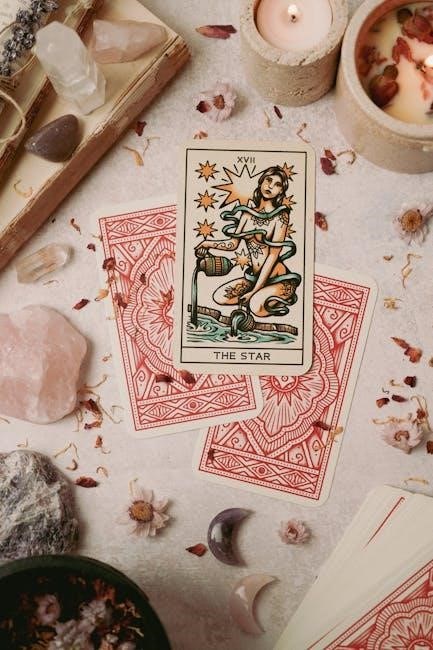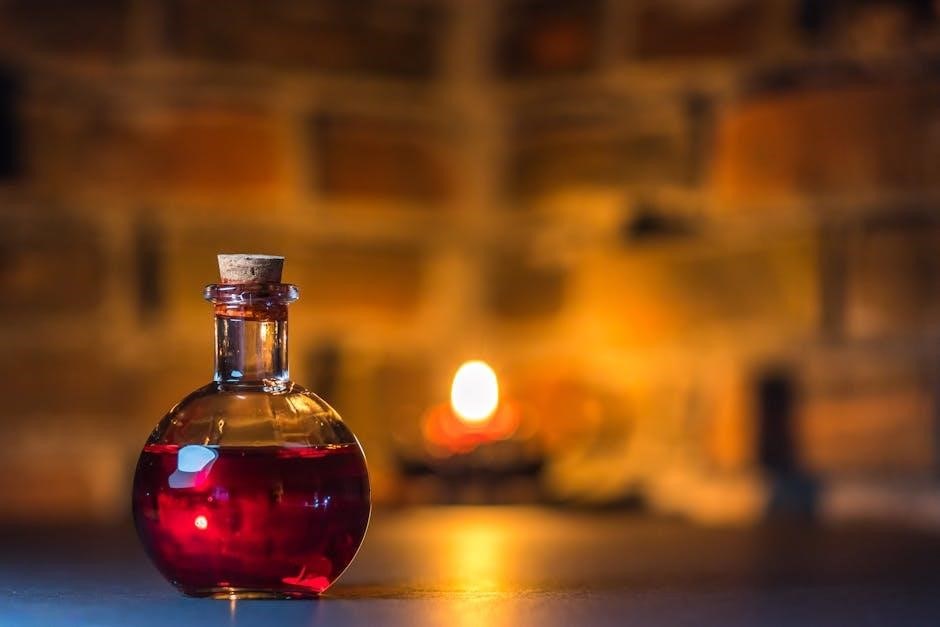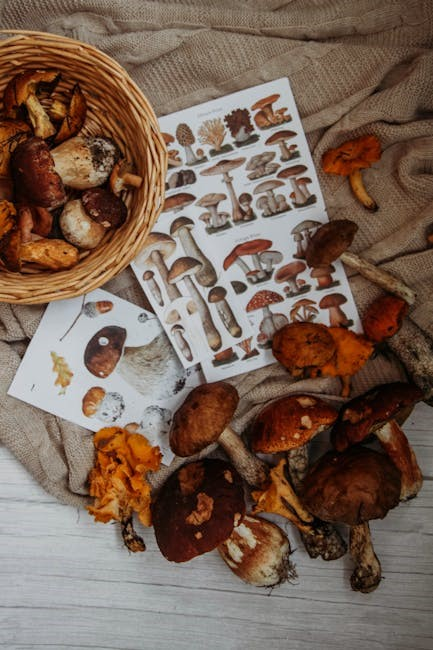Alchemy is a powerful trade skill exclusive to Shamans, allowing the creation of potions that provide buffs, damage shields, and mana regeneration, making it indispensable for both personal use and profit in the game’s economy.
1.1 What is Alchemy and Its Importance
Alchemy is a unique trade skill in EverQuest, exclusive to Shamans, enabling the creation of potions that grant buffs, damage shields, mana regeneration, and other beneficial effects. These potions enhance gameplay by providing abilities not inherently available to classes. Alchemy is not only a tool for personal advancement but also a valuable asset for earning platinum through sales in the Bazaar, making it a cornerstone of both gameplay and economy.
1.2 Benefits of Alchemy for Shamans
Alchemy is a vital skill for Shamans, offering unique benefits that enhance their gameplay. It allows Shamans to craft potions that boost mana regeneration, provide damage shields, and grant beneficial effects like buffs and illusions. These potions not only enhance a Shaman’s personal performance but also enable them to support groups more effectively. Additionally, Alchemy provides a lucrative way to earn platinum by selling crafted items, making it a practical and powerful tool for any Shaman in EverQuest.

Getting Started with Alchemy
Alchemy begins at level 25 for Shamans, requiring a visit to the Shaman guild to start training. Initial costs can be high, so resource management is crucial.
2.1 Prerequisites for Learning Alchemy
To begin with Alchemy, Shamans must reach at least level 25 and locate their class guild. Training initially requires 21 practice points, with no additional points allocated beyond this threshold. Ensuring access to necessary tools and ingredients is also essential for starting the craft effectively. This foundational step sets the stage for mastering Alchemy and creating beneficial potions for both personal use and trade. Proper preparation ensures a smooth progression in skill development.
2.2 Initial Setup and Tools Needed
To start Alchemy, Shamans need a medicine bag, which can be purchased from Alchemy Suppliers in West Freeport. Essential tools include ingredients like Sage Leaf, Benzoin, and Blue Vervain Bulb, obtained from vendors or through farming. A recipe book is also necessary to organize and track potion recipes. Additionally, having a steady supply of Platinum is crucial for purchasing materials. Optional tools like a mortar and pestle can enhance efficiency, though they are not required initially. Proper organization ensures a smooth crafting experience.

The Alchemy Trophy
The Alchemy Trophy is obtained from Event Coordinator Baublie Diggs in West Freeport at level 50, enabling skill progression beyond 100 and enhancing potion crafting efficiency.
3.1 Obtaining the Alchemy Trophy Task
To obtain the Alchemy Trophy task, Shamans must reach level 50 in Alchemy and visit Event Coordinator Baublie Diggs in West Freeport. This quest is essential for advancing beyond skill level 100 and unlocking higher-level recipes. Completing the task allows for more efficient potion crafting and is a milestone in mastering Alchemy. Failing to acquire the trophy by level 100 can hinder progression, making it a critical step for any Shaman serious about maximizing their crafting potential.
3.2 Completing the Trophy for Maximum Efficiency
Completing the Alchemy Trophy task is crucial for maximizing efficiency in potion crafting. Once obtained, it allows Shamans to craft potions with reduced resource waste and increased success rates. The trophy also unlocks higher-level recipes, enabling the creation of advanced potions that are highly sought after in the game. Failing to complete this step can significantly hinder progression, making it essential for any Shaman aiming to master Alchemy and contribute effectively to their group or the in-game economy.

Essential Alchemy Recipes
Essential Alchemy recipes provide buffs, damage shields, and mana regeneration, categorized into beginner, intermediate, and advanced potions, with Nodding Blue Lily being key for high-level crafting efficiency.
4.1 Beginner Potions (Levels 1-100)
Beginner potions (Levels 1-100) are fundamental for new alchemists. These include Sage Leaf potions for minor mana regeneration and Benzoin potions for basic damage shields. Crafting these potions is cost-effective and provides a solid foundation for skill progression. Essential ingredients like Sage Leaf and Benzoin are readily available from vendors or through early-game farming. Mastering these recipes ensures a smooth transition to higher-level alchemy, making them a crucial starting point for any Shaman looking to enhance their capabilities and contribute effectively in groups or solo play.
4.2 Intermediate Potions (Levels 100-200)
Intermediate potions (Levels 100-200) build on foundational skills, introducing more complex recipes like Potion of Heat and Aura of Cold. These potions offer enhanced buffs, such as increased stamina or cold resistance, and require rarer ingredients like Allspice and Birthwart. Crafting these potions improves efficiency and unlocks higher-level recipes. Ingredients can be farmed from dungeons or purchased from vendors. Mastering these potions is essential for progressing to advanced alchemy and enhancing your Shaman’s versatility in both solo and group play scenarios.
4.3 Advanced Potions (Levels 200-300)
Advanced potions (Levels 200-300) require rare ingredients like Nodding Blue Lily, offering powerful effects such as enhanced mana regeneration or damage mitigation. These high-level recipes are essential for endgame content and raids. Crafting these potions demands precision and access to specific components, often requiring farming in challenging zones like the Crypt of Decay. Mastering these recipes is crucial for maximizing your Shaman’s potential and creating highly sought-after items for the Bazaar, making them a valuable asset in both gameplay and economy.
Expansion-Specific Recipes
Expansion-specific alchemy recipes, like those from Empires of Kunark and Prophecy of Ro, introduce new ingredients and potion effects, enhancing gameplay and offering unique benefits.
5.1 Empires of Kunark (EoK) Recipes
Empires of Kunark introduced unique alchemy recipes, featuring ingredients like Nodding Blue Lily, which are essential for crafting high-level potions. These recipes offer enhanced effects such as improved mana regeneration and damage shields, making them invaluable for advanced players. The EoK expansion also streamlined certain potion-making processes, reducing costs and increasing efficiency. Players can access these recipes by completing specific tasks or purchasing ingredients from vendors in key locations across Norrath.
5.2 Prophecy of Ro (PoR) Recipe Overhauls
The Prophecy of Ro expansion brought significant changes to alchemy recipes, simplifying many processes and introducing new ingredients. This overhaul aimed to balance potion crafting, making it more accessible while maintaining complexity for advanced players. Certain high-level recipes were streamlined, reducing the number of rare components required. These changes encouraged players to experiment with crafting without excessive resource drain, fostering a more dynamic alchemy system in EverQuest.

Practical Tips for Alchemy
Maximize efficiency by managing resources wisely, using Ctrl+Click for bulk crafting, and maintaining an organized inventory to minimize waste and streamline potion production.
6.1 Best Practices for Crafting Potions
To master potion crafting, always organize your inventory to avoid wasting ingredients. Use Ctrl+Click for bulk crafting to save time. Plan recipes in advance to ensure you have all components. Prioritize high-demand potions like mana regeneration or damage shields for better profitability. Keep your medicine bag easily accessible and regularly clean up failed crafts. Finally, experiment with vendor-bought ingredients to minimize farming time and focus on high-level potions for maximum efficiency.
6.2 Managing Resources and Costs
Effectively managing resources is crucial for profitable alchemy. Track ingredient costs and prioritize farming high-demand components like Nodding Blue Lily. Consider using vendor-bought items to minimize farming time. Plan recipes to reduce waste and optimize ingredient usage. Monitor the Bazaar for potion demand to focus on high-margin crafts. Regularly assess your inventory to avoid overspending and ensure a sustainable crafting process. Balancing costs and output is key to making alchemy a profitable and enjoyable trade skill.

Time-Locked Progression (TLP) Alchemy
In TLP servers, alchemy progression mirrors the game’s expansion timeline, requiring players to adapt recipes as content unlocks, ensuring a balanced and era-appropriate crafting experience.
7.1 Understanding TLP Alchemy Mechanics
In Time-Locked Progression (TLP) servers, alchemy follows the game’s original expansion timeline, with recipes and crafting mechanics unlocking as content progresses. Players must adapt to era-specific ingredients and restrictions, ensuring a balanced experience. This system mimics the game’s historical progression, requiring crafters to use period-appropriate resources and techniques. Understanding TLP mechanics is crucial for optimizing alchemy on these servers, as it aligns crafting capabilities with the server’s expansion phase.
7.2 Optimizing Recipes for TLP Servers
On TLP servers, alchemy requires careful recipe selection based on the current expansion. Research era-specific ingredients and crafting requirements to maximize efficiency. Focus on recipes that align with the server’s progression phase, ensuring resources are used effectively. Prioritize potions in high demand during each era to minimize waste and optimize skill gains. This approach ensures smooth progression and profitability while adhering to the server’s restrictive environment.

Advanced Alchemy Techniques
Advanced alchemy involves crafting rare potions and utilizing unique ingredients like Nodding Blue Lily for high-level effects, requiring precise techniques and resource management to master.
8.1 Crafting Rare and Special Potions
Crafting rare potions requires precision and rare ingredients like Nodding Blue Lily. Potions such as Potion of Heat or Potion of Aura of Cold provide unique effects like stamina boosts or cold resistance. These recipes often demand specific components, making them challenging to craft. Farming rare herbs from zones like Crypt of Decay is essential. Experimenting with ingredient combinations can yield powerful results, but balancing resource costs is key to avoiding unnecessary expenses. These potions are highly sought after, making them valuable for both personal use and sale.
8.2 Utilizing Nodding Blue Lily for High-Level Potions
Nodding Blue Lily is a crucial ingredient for crafting advanced potions, particularly for levels 244-300. Found in zones like Crypt of Decay, this herb is essential for high-end recipes. Each potion in this range uses the same base ingredients, with the Lily determining the final effect. Players can choose the desired potion by selecting one vendor-bought component. Farming Nodding Blue Lily is time-consuming but necessary for mastering these potent brews, which are highly sought after for their powerful effects in late-game content.

Alchemy and the EverQuest Economy
Alchemy significantly impacts EverQuest’s economy, as potions like Vials of Prismatic Dye and high-end brews are in high demand. Crafting for profit or personal use balances resource management and market supply, making it a vital trade skill for economic success.
9.1 Selling Potions in the Bazaar
Selling potions in the Bazaar is a lucrative way to profit from Alchemy. High-demand items like Vials of Prismatic Dye and advanced brews fetch premium prices. Timing your sales during peak hours, such as raid nights or expansion launches, maximizes profit. Competitive pricing is key, as oversupply can lower demand. Crafting rare potions with unique effects, such as Illusion or Shrink potions, also attracts niche buyers. Balancing supply and demand ensures steady income, making Alchemy a valuable trade skill for economic success in EverQuest.
9.2 Crafting for Personal Use vs. Profit
Crafting for personal use allows Shamans to create potions that enhance their gameplay, such as Skinspike potions for DPS or healing potions for raids. This approach focuses on convenience and effectiveness, enabling players to optimize their performance without relying on the Bazaar. Conversely, crafting for profit involves producing high-demand items like Vials of Prismatic Dye or rare potions, which can be sold for significant platinum. Balancing both strategies ensures Shamans can support their gameplay while generating income, making Alchemy a versatile and valuable skill.
Mastery of Alchemy in EverQuest requires patience, strategy, and practice. By following this guide, Shamans can unlock the full potential of potion crafting, enhancing gameplay and profitability.
10.1 Final Tips for Mastering Alchemy
To excel in Alchemy, consistently farm rare ingredients like Nodding Blue Lily and experiment with expansion-specific recipes. Keep your trophy upgraded for efficiency and sell surplus potions in the Bazaar to sustain costs. Regularly update your recipe list, especially during expansions, and consider crafting for both personal use and profit to maximize your skill’s potential in EverQuest.